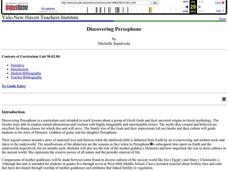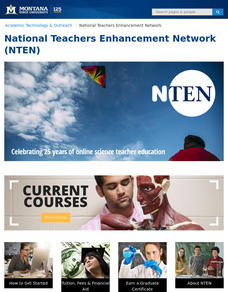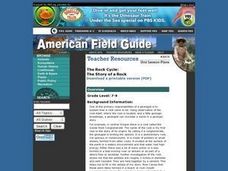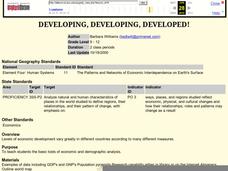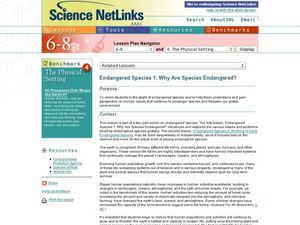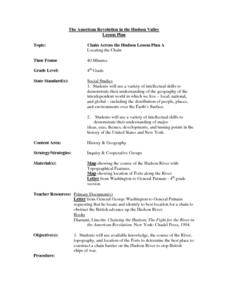American Museum of Natural History
A Closer Look at Mars
A website looks at how we know so much about Mars—telescopes, robots, and spacecraft—and the search for martian life. Following the informational text are three questions that quiz pupils about possible life on Mars.
Yale University
Discovering Persephone
Here is a resource that introduces learners to how the stories from Greek mythology explain the workings of natural phenomena, movements of the seasons, and how the conflicts of the gods mimic our own daily difficulties. Learners...
Curated OER
Salt: White Gold
Middle schoolers examine the importance of salt for trade routes and the economy of a community.
Curated OER
Location, Location, Location: Civilization's Ultimate Advantage
Students discover how geographical advantages, locational and regional, ultimately led to western Eurasian societies' disproportionate accounting of world power and innovation. They utilize a workbook which can be downloaded within this...
Curated OER
What Are We Going To Do About Baby Six Billion?
Students formulate and evaluate suggestions about government policy using demographic examples and projections. They examine websites and utilize worksheets imbedded in this plan.
Curated OER
Scarcity of Land Throughout the World and in Hawaii
Students discuss the importance of "land." They review the four types of land classification--urban, rural, agricultural and conservation--and participate in an activity involving an apple that demonstrates the use of land in Hawaii....
Curated OER
Planetary Surface Evolution and Resurfacing
Students are provided with drawings of planet surfaces in order to investigate different types of planetary terrain. They make observations for each planet and discuss the characteristics observed. The lesson plan includes background...
Curated OER
Sybil Ludington's Ride - a poem
Fourth graders examine the role a teen from the Hudson Valley played in the American Revolution. They view the map of Sybil's ride and calculate the distance using the map's legend.
Curated OER
Why Kosovo? Why Now?
Students explain the establishment of the modern state of Yugoslavia and the breakup of the country. They examine the human characteristics of the region - ethnic groups, languages, and religions.
Curated OER
Stream Quality Assessment
Students investigate many of the factors that affect water quality. They take measurements and water samples at a local stream and evaluate the health of their community's watershed. They write a report detailing their findings.
Curated OER
The Rock Cycle: The Story of a Rock
Pupils describe the changes undergone by rocks during the rock cycle and develop an understanding of the interconnectedness of the rock cycle.
Curated OER
Developing, Developing, Developed!
Young scholars differentiate among and explain various levels of economic development around the world. They see that levels of economic development vary greatly in different countries according to many different measures.
Curated OER
Interplanetary Travel Guide
In groups of six, middle school space scientists create an imaginative travel brochure for attracting visitors to the planet Mars. Information must include surface features and atmospheric conditions. Although time-consuming, this is a...
Curated OER
Crystal Blue Persuasion
Students examine historic posters, jewelry, quilts and buttons that were created to protest or call attention to a political issue. After evaluating how these items were used to communicate a political message, students create an item...
Curated OER
Silk Road Caravan
Learners determine how the geographic features of the Silk Road trade route contributed to the economic development and diffusion of culture in both Eastern and Western Civilizations.
Curated OER
7th Grade Scientific Notation
Middle-school mathematicians identify the need for scientific notation. Learners convert large and small numbers into scientific notation. Students review the powers of ten and write them on the board in standard form and scientific...
Curated OER
Endangered Species 1: Why are Species Endangered?
Emerging ecologists examine endangered species by visiting the US Environmental Protection Agency website. They consider human contribution to the decline of different species. They research an endangered animal and then craft a poster...
Curated OER
Hunt the Fact Monster #30
For this search engine worksheet, 3rd graders will need to use factmonster.com to discover answers. Students will respond to 10 short answer questions using the given website.
Curated OER
Rock of Ages
Learners are given a classification table and samples from their location. They locate their samples on the classification table using the characteristics used in rock identification.
Smithsonian Institution
Watching Crystals Grow
Amazing science can sometimes happen right before your eyes! The class gets cozy as they watch crystals grow. They use Epsom salts, rocks, and food coloring to create crystals. They'll observe the entire process, documenting every step...
Curated OER
Cartogram of the Great Compromise
Young scholars create cartograms of populations during 1790.
Curated OER
Chain Across the Hudson Lesson Plan A - Locating the Chain
Students read a letter from George Washington requesting them to identify on a map a location that would stop the advance of British warships. They choose a location and justify their choice.
Curated OER
Education is the Meaning of Life
Students explore the teachings of Confucius. In this Korean culture lesson, students watch segments of the A and E video "Confucius: Words of Wisdom." Students read handouts regarding the Asian education system and discuss their...
Curated OER
Where Am I?
Extensive background on marine navigation is provided for you as the teacher. Assign groups to research marine navigation techniques and construct astrolabes. Resource links are listed for extension ideas. If you are teaching an...
Other popular searches
- Earth's History Time Line
- Soil and Earth's History
- Powerpoint Earth's History
- Earth's History Timeline

